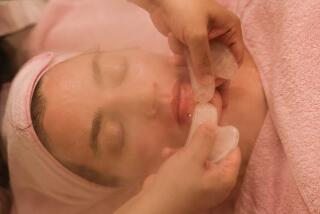Kiehl’s makes a play for millennials with healthy skin pitch
- Share via
Kiehl’s is placing its bets in antiaging — just don’t call it that. This week the brand is rolling out its latest innovation, the Pure Vitality Skin Renewing Cream. For the L’Oréal-owned Kiehl’s, the cream is its most ambitious launch in terms of research and development and global reach in recent history. It is also a grab at the discerning Millennial consumer who has turned its nose up at traditional wrinkle creams and line correctors that employ antiaging jargon.
“The number-one goal with skin care these days is not so much reversing the signs of aging but addressing a more healthy, radiant look,” said Cheryl Vitali, general manager of Kiehl’s Worldwide. “[With Pure Vitality] we don’t talk about lines and wrinkles.”
Entering more than 1,800 doors in 62 countries, industry sources estimate the cream could generate up to $40 million in global retail sales — including $10 million in the U.S. market — this year.
Instead of focusing on wrinkle-reduction, Pure Vitality is a cream that aims to address the face with a holistic view of improving the overall look and feel of skin. Kiehl’s is marketing the product as 99.6 percent-naturally derived, with main ingredients — manuka honey and red ginseng root — that sound more like grocery list items than science experiments. Perhaps most importantly to selfie-loving Millennials, Pure Vitality claims to impart a healthy glow.
Health is a key buzzword for Kiehl’s as it forges ahead in a slow-growing prestige skin-care market.
“We know that antiaging is still a hot topic, a hot market opportunity,” said Chris Salgardo, U.S. president at Kiehl’s. “But consumers aren’t focused on wrinkles or obsessing over the fact that they’re aging. There’s more of a focus on ‘How do I get my skin to look its best?’ [and] ‘How do I obtain healthy skin?’”
For Millennials, a healthy look is connected to lifestyle and eating habits, and it all feeds back into the naturals trend, which according to Vitali and Salgardo, is not going away anytime soon.
“When you think about skin-care it isn’t what you’re putting on top of your skin, it’s the lifestyle…think of the rise of these superfoods — avocado, quinoa, Manuka honey,” said Salgardo. “Consumers want to be their best selves and have their healthiest skin ever, and Millennials are an extremely influential group and play a huge role in this market shift.”
To that end, ensuring 99.6 percent naturality was of key importance in developing Pure Vitality.
“We’re seeing great growth in natural products — not only in the U.S,” Vitali said. “Our numbers are 8 percent growth in natural skin care versus a flat market.” Vitali’s view is global. Within the Kiehl’s assortment, there are a few other natural products, including the Miracle Recovery Concentrate, which she noted is the bestseller in Europe.
The ingredient story — manuka honey and red ginseng root — is key to the Pure Vitality launch. Said Geoffrey Genesky, head of the Kiehl’s skin-care laboratory, the manuka honey contains antioxidants that fight against environmental aggressors and stimulates collagen to strengthen the skin barrier, while the red ginseng root increases hydration and encourages cell turnover to prevent dull skin. Genesky also noted that the cream was developed to have a more appealing texture than other natural products on the market, designed to draw in consumers, who are not accustomed to purchasing natural skin care from a big brand.
But more importantly, these ingredients have backstories — the manuka honey is sourced from New Zealand and the red ginseng root comes from South Korea. A generation that values transparency, Millennials want to know what their skin care ate for dinner.
“We see within the natural trend [that] it’s not enough just to be natural,” Vitali said. “[Consumers] want to know what the ingredients are, they want to research them and feel comfortable about that.”
Vitali is bullish that the prestige skin-care market can recover from its sluggish sales growth as of late. She referred to 2016 as an “adjustment period,” but “I think we’re a ready for a new [upward] trend.”
“What I think is next in skin care is more of that immediate gratification,” Vitali said. “Whether that’s hybrid skin care, people not wanting to wait eight weeks for results, [or] wanting to see something right away, [skin-care benefits in the future will be more like] something that happens with makeup.”
ALSO
Skincare lines that promise no toxic chemicals
Revolve gets into the beauty game and launches #Revolvebeauty
Why Rob Lowe geeked out on under-eye cream and more







